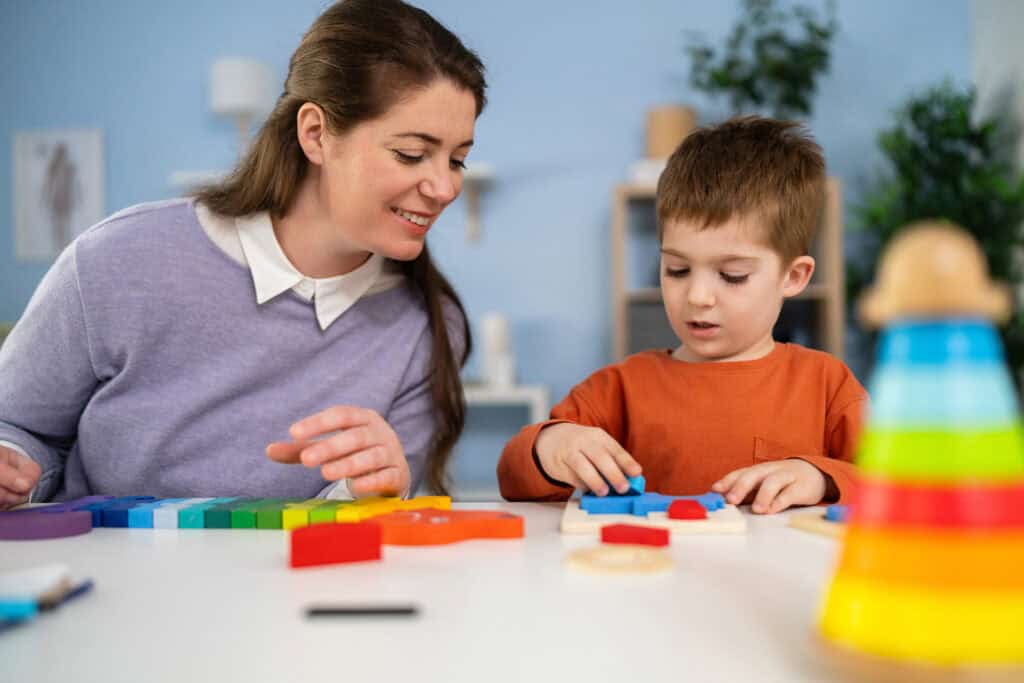If your child has ever attended pediatric therapy, you’ve probably noticed that it looks a lot like playtime. But even though play-based therapy is a lot of fun, it is also a proven way to help children achieve their developmental goals.
At No Limits Pediatric Therapies in Bentonville, AR, we provide comprehensive pediatric physical, speech, occupational, and feeding therapy to help children reach their full potential. Today, I want to discuss the benefits of play-based therapy and how it can lead to improved outcomes for children with developmental challenges.
What Is a Sensory Processing Disorder?
A sensory processing disorder (SPD) happens when the brain has trouble receiving and responding to information that comes in through the senses. Children with SPD may be over-sensitive or under-sensitive to sensory input.
Over-sensitivity can result in extreme reactions to everyday stimuli, like loud noises or bright lights. Under-sensitivity may lead to a lack of response to these same stimuli. Both types of sensitivity are signs of a sensory processing disorder and can significantly impact a child’s daily life.
How Does a Sensory Processing Disorder Affect a Child’s Life?
Children with sensory processing disorders can face a variety of challenges, including:
- Difficulty with motor skills and coordination
- Struggles with academic performance
- Trouble engaging in social interactions
- Behavioral issues such as meltdowns or aggression
- Difficulty with self-care activities like dressing and eating
- Challenges in adapting to new environments or routines
Play-Based Therapy Helps Children Learn to Tolerate Different Types of Sensory Input
Play-based therapy uses play activities to help children learn to tolerate and respond appropriately to different types of sensory input. By integrating sensory experiences into play, therapists can create a fun and engaging environment that encourages children to explore and adapt to sensory input in a positive way.
Pediatric therapists work to improve a child’s tolerance for many different sensations, such as:
- Touch – We introduce different textures and materials to help children become more comfortable with tactile sensations.
- Proprioception – Proprioception is the sense that tells us where our body parts are in space. We engage in activities that provide deep pressure input to help children understand their body position and movement.
- Visual Input – We use visual stimuli such as lights, colors, and patterns to help children adapt to visual changes in their environment.
- Taste – We can introduce a variety of flavors and textures to help children with feeding issues become more comfortable with different foods.
Many Children Benefit from Sensory Processing Therapy as Part of Their Pediatric Therapy Plan
Children with sensory processing disorders often struggle with other developmental skills that can be addressed by occupational, physical, speech, or feeding therapy. Pediatric therapists can incorporate sensory processing therapy into your child’s overall treatment plan to address all of their needs fully.
This approach can help children improve their ability to function in everyday activities and enhance their overall development. Plus, because our treatments are play-based, your child will have a ton of fun while learning new skills and achieving their goals.
Reach Out to No Limits for an Evaluation
If you’re concerned about your child’s sensory processing or developmental progress, give us a call at (479) 250-9838 for a free 15-minute developmental consultation. Our experienced therapists can help determine if pediatric therapy is recommended for your child, and we’ll provide the support they need to grow with no limits.
About Terrica
Terrica Weatherford, MSOT, founded No Limits Pediatric Therapies in 2016. She earned her Master of Science in Occupational Therapy from the Medical University of South Carolina in 2012. For over 13 years, Terrica has been committed to helping neurodiverse children (and those who need extra support) reach their full potential. She founded her practice to ensure she could provide exceptional care for children and their families.
